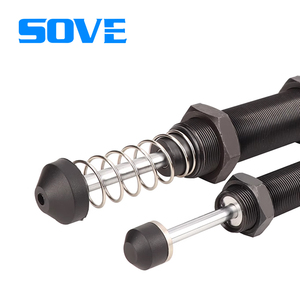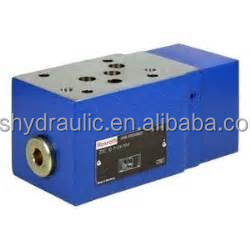
All categories
Featured selections
Trade Assurance
Buyer Central
Help Center
Get the app
Become a supplier

(1652 products available)
































Hydraulic pressure compensators regulate fluid pressure to maintain consistent operation in various systems. There are types ranging from mechanical to electronic compensators, each suited to specific industrial requirements.
These traditional devices adjust pressure based on mechanical linkages and often springs or bellows. The features are simple designs, reliable operations without electricity, and are usually used in basic applications, offering low to moderate pressure compensation.
These devices separate the hydraulic fluid from the pressure medium using a flexible diaphragm. This compensator is crucial in systems where fluid contamination must be eliminated. Key features are robust design against chemical corrosion, particularly in toxic or hazardous fluid environments, and compact size suitable for space-constrained installations.
Hydraulic fluid is isolated from its pressure source by a metal bellow in this apparatus. The main applications of bellows compensators are in systems with extreme temperatures or where chemical resistance is critical. The compensators have features like a solid barrier to pressure differentials, a long lifespan under dynamic conditions, and are suitable for systems that require tight space constraints.
Modern systems increasingly use electronic compensators that employ sensors and control algorithms to maintain desired pressure levels. The main features are high precision, the ability to adjust compensation dynamically, and compatibility with advanced control systems. These are usually favorite in industries where automation and real-time pressure control are crucial.
The selection of materials for components is critical in determining the durability of hydraulic pressure compensators. It directly impacts reliability, especially in high-pressure or extreme environmental applications. Therefore, it is vital to know the construction materials and their long-term performance.
Stainless steel is preferred for many hydraulic compensators due to its excellent resistance to corrosion. This property makes it suitable for use in chemical processing, marine environments, or any application where moisture exposure is likely to lead to rust in other metal types. Key advantages are strength, durability, and resistance not only to corrosion but also to high temperatures. This permits stainless steel compensators to operate in often extreme environments.
In applications where weight is a concern, such as aerospace or automotive, high-strength alloys are used. These materials include titanium and aluminum alloys, which offer superior strength-to-weight ratios. Thus, the features of high-strength alloys are lightweight construction without sacrificing durability and excellent performance under fatigue conditions. This makes them suitable for dynamic environments.
Diaphragm compensators frequently use elastomeric materials, including nitrile or neoprene. These materials offer flexibility and can create a tight seal separating the hydraulic fluid from the pressure medium. While not as durable as metals in high-temperature environments, elastomers are vital in systems requiring chemical resistance or sterile processing. Their key features are pliability, hermetic sealing capability, and resistance to breaking under cyclic loads.
Ceramics are an excellent option for Bellows compensators in applications requiring extreme temperatures. These materials can withstand heat better than almost any metal, providing a longer lifespan in high-temperature environments. Furthermore, ceramics offer high resistance to wear and corrosion. This makes them essential for industries like aerospace or petrochemical.
Hydraulic pressure compensators are invaluable in multiple commercial settings requiring high efficiency and system reliability. Below are some prominent examples where these devices play critical roles.
Compensators control the hydraulic pressures of industrial machines, thus ensuring the consistency of operations during the workload changes. This is especially important in factories that employ large presses and molding machinery. In these environments, pressure variations can significantly impact product consistency. The features are improved production quality, reduced machine wear, and minimized downtime due to pressure fluctuations.
The pressure compensators maintain constant pressure during the phase changes in the injection and holding. Fluctuations at this stage can lead to defects in molded items like automotive parts. Therefore, compensators guarantee precision at this critical procedure step in the auto parts industry. They enhance product quality and reliability.
In heavy construction equipment like excavators and loaders, compensators maintain pressure in the hydraulic fluid even under competitive loads. This guarantees that the equipment functions effectively and does not suffer from pressure swings that reduce its arsenal lifespan. In construction settings, dependable operation translates directly into productivity gains, thus enabling workers to complete tasks quickly and efficiently.
Compensators balance differences in hydraulic brake systems to guarantee legitimate vehicle protection. Automobile brake systems exemplify why putting compensators in automotive applications is crucial. Safety is the primary concern, but smooth braking and reduced brake component wear increase performance.
Selecting the appropriate hydraulic pressure compensator for a specific application involves several key considerations. By following these factors, buyers can make informed decisions that ensure optimal performance.
Compensators must function safely even under maximum pressure without failure or significant degradation. Always select a compensator with a pressure range that is at least equal to the user's system needs.
Compensators selected should easily operate in extreme cold or heat. Temperatures beyond the operating range will degrade the compensator materials and possibly catastrophically fail them too. Consider the working temperature range and choose the one that best fits the requirements. These compensators are always suitable from cryogenic temperatures to over 1,000°C.
What kind of the environment is the compensator tested? Compensators used in outdoor or hazardous settings must feature corrosion-resistant materials. These include stainless steel or high-strength alloys. Conversely, compensators for indoor use can be in less-demanding environments with more cost-effective materials.
The compensator material must be compatible with the hydraulic fluid used in the system. Certain chemicals in these fluids may have the potential to degrade the compensator materials. Ensure the manufacturers have listed all fluids compatible with their products to help avoid matches that destroy the system.
Is the compensator's speed of adjustment critical for the application? The mechanical and diaphragm compensators are moderately fast, while electrical compensators provide real-time adjustments. Systems needing quick compensator reactions to pressure changes generally require electronic versions.
A. Yes, but only a few types, like mechanical pressure compensators, have a universal application when they fit almost all commonly used systems.
A. The automotive and aerospace industries like these compensators the most. This is because they require advanced precision and real-time pressure regulation.
Always ensure the selected compensator materials are compatible with the chemical composition of the fluid to guarantee the system's safety and longevity.
Use one made of corrosion-resistant materials like stainless steel to guarantee long-term reliability in such hostile environments.
When wear or degradation of a compensator begins to affect system performance, then it is time for industries to change their compensator.